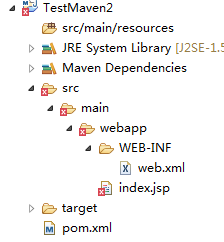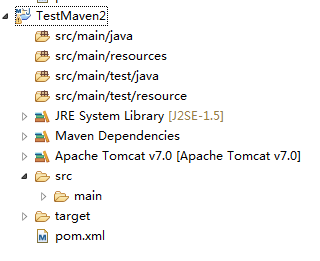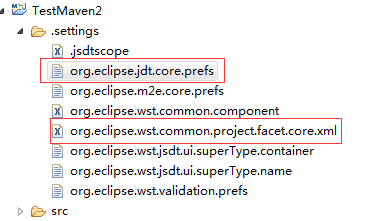Eclipse利用Maven2搭建SpringMVC框架的Web工程
一、准备工作:
下载apache-maven--> 配置Maven_home -->下载Eclipse Maven插件
二、新建工程:
选择新建Maven Project archetype选择webapp-->输入group ID (src下包名)和Artifact ID (工程名)
新建Maven工程目录如上图
三、补齐缺失的文件夹:
添加Server支持和缺失的源文件夹
四、添加springMvc支持和web容器支持(若没有,打包时会报错)
<project xmlns="http://maven.apache.org/POM/4.0.0" xmlns:xsi="http://www.w3.org/2001/XMLSchema-instance" xsi:schemaLocation="http://maven.apache.org/POM/4.0.0 http://maven.apache.org/maven-v4_0_0.xsd"> <modelVersion>4.0.0</modelVersion> <groupId>com.maven.my</groupId> <artifactId>TestMaven2</artifactId> <packaging>war</packaging> <version>0.0.1-SNAPSHOT</version> <name>TestMaven2 Maven Webapp</name> <url>http://maven.apache.org</url>
<properties>
<spring.version>4.1.5.RELEASE</spring.version>
</properties>
<dependencies>
<dependency>
<groupId>junit</groupId>
<artifactId>junit</artifactId>
<version>3.8.1</version>
<scope>test</scope>
</dependency>
<dependency>
<groupId>org.springframework</groupId>
<artifactId>spring-webmvc</artifactId>
<version>${spring.version}</version>
</dependency>
<dependency>
<groupId>javax.servlet</groupId>
<artifactId>javax.servlet-api</artifactId>
<version>3.1.0</version>
</dependency>
</dependencies>
<build>
<finalName>TestMaven2</finalName>
</build>
</project>(五)修改工程配置:
在以上两个文件中修改jdk版本为1.7以上 web为3.0
六:添加springMvc配置:
web.xml
<?xml version="1.0" encoding="UTF-8"?> <web-app xmlns:xsi="http://www.w3.org/2001/XMLSchema-instance" xmlns="http://java.sun.com/xml/ns/javaee" xmlns:web="http://java.sun.com/xml/ns/javaee/web-app_3_0.xsd" xsi:schemaLocation="http://java.sun.com/xml/ns/javaee http://java.sun.com/xml/ns/javaee/web-app_3_0.xsd" id="study" version="3.0"> <display-name>Archetype Created Web Application</display-name> <description>sprintMVC环境搭建</description> <!-- 加载Spring配置文件 --> <context-param> <param-name>contextConfigLocation</param-name> <param-value>classpath:configs/beans.xml</param-value> </context-param> <!-- Spring监听 --> <listener> <listener-class>org.springframework.web.context.ContextLoaderListener</listener-class> </listener> <!-- Spring MVC配置 --> <servlet> <servlet-name>Dispatcher</servlet-name> <servlet-class>org.springframework.web.servlet.DispatcherServlet</servlet-class> <!-- 自定义spring mvc的配置文件名称和路径 --> <init-param> <param-name>contextConfigLocation</param-name> <param-value>classpath:configs/beans-mvc.xml</param-value> </init-param> <load-on-startup>1</load-on-startup> </servlet> <!-- spring mvc 请求后缀 --> <servlet-mapping> <servlet-name>Dispatcher</servlet-name> <url-pattern>/</url-pattern> </servlet-mapping> <welcome-file-list> <welcome-file>index.jsp</welcome-file> </welcome-file-list> </web-app>
src/com/main/resources文件夹下的beans.xml和beans-mvc.xml
beans.xml:
<?xml version="1.0" encoding="UTF-8"?> <beans xmlns="http://www.springframework.org/schema/beans" xmlns:context="http://www.springframework.org/schema/context" xmlns:xsi="http://www.w3.org/2001/XMLSchema-instance" xsi:schemaLocation="http://www.springframework.org/schema/beans http://www.springframework.org/schema/beans/spring-beans-3.0.xsd http://www.springframework.org/schema/context http://www.springframework.org/schema/context/spring-context-3.0.xsd" > <context:property-placeholder /> <context:annotation-config /> </beans>
<?xml version="1.0" encoding="UTF-8"?> <beans xmlns="http://www.springframework.org/schema/beans" xmlns:xsi="http://www.w3.org/2001/XMLSchema-instance" xmlns:aop="http://www.springframework.org/schema/aop" xmlns:util="http://www.springframework.org/schema/util" xmlns:context="http://www.springframework.org/schema/context" xmlns:p="http://www.springframework.org/schema/p" xmlns:mvc="http://www.springframework.org/schema/mvc" xmlns:task="http://www.springframework.org/schema/task" xsi:schemaLocation=" http://www.springframework.org/schema/beans http://www.springframework.org/schema/beans/spring-beans.xsd http://www.springframework.org/schema/aop http://www.springframework.org/schema/aop/spring-aop.xsd http://www.springframework.org/schema/context http://www.springframework.org/schema/context/spring-context.xsd http://www.springframework.org/schema/util http://www.springframework.org/schema/util/spring-util.xsd http://www.springframework.org/schema/cache http://www.springframework.org/schema/cache/spring-cache.xsd http://www.springframework.org/schema/jdbc http://www.springframework.org/schema/jdbc/spring-jdbc.xsd http://www.springframework.org/schema/mvc http://www.springframework.org/schema/mvc/spring-mvc.xsd "> <context:property-placeholder /> <!-- MVC控制类扫描 --> <context:component-scan base-package="com.my.controller" /> <mvc:annotation-driven /> <!-- 视图解析器:定义跳转的文件的前后缀 --> <bean id="viewResolver" class="org.springframework.web.servlet.view.InternalResourceViewResolver"> <property name="prefix" value="/view/" /> <property name="suffix" value=".html" /> <!--可为空,方便实现自已的依据扩展名来选择视图解释类的逻辑 --> </bean> <mvc:default-servlet-handler /> </beans>
七:补齐自己的controller
package com.my.controller; import javax.servlet.http.HttpServletRequest; import org.springframework.stereotype.Controller; import org.springframework.web.bind.annotation.RequestMapping; @Controller @RequestMapping("/user") public class UserController { @RequestMapping(value="/getUserInfo") public String getUserInfo(HttpServletRequest request){ System.out.println("=========="); return "user"; } }
八:部署运行,输入http://localhost:8180/TestMaven2/user/getUserInfo访问。


